12 june 2019
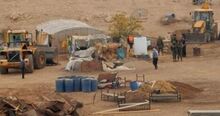
The Israeli occupation forces (IOF) on Wednesday morning destroyed dozens of agricultural structures and equipment as well as several tents and scores of water tanks in Ras al-Ahmar hamlet, east of Tubas city in the West Bank.
Local farmer Abdullah Bani Awdeh told a reporter for the Palestinian Information Center (PIC) that dozens of Israeli troops escorting military bulldozers stormed the hamlet and embarked on razing crude barns and residential tents.
Awdeh added that the soldiers also destroyed about 50 plastic water tanks.
For his part, local activist Aref Daraghmeh told the PIC that the IOF wreaked havoc on the hamlet, destroying tents, crude barns, solar energy equipment and dozens of water tanks belonging to local residents.
Local farmer Abdullah Bani Awdeh told a reporter for the Palestinian Information Center (PIC) that dozens of Israeli troops escorting military bulldozers stormed the hamlet and embarked on razing crude barns and residential tents.
Awdeh added that the soldiers also destroyed about 50 plastic water tanks.
For his part, local activist Aref Daraghmeh told the PIC that the IOF wreaked havoc on the hamlet, destroying tents, crude barns, solar energy equipment and dozens of water tanks belonging to local residents.
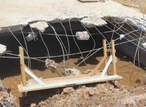
Israeli soldiers invaded, Wednesday, Aqabat Jabr village, east of Tubas in northeastern West Bank, and demolished a water well.
Resident Mohammad Yousef Dibik said the soldiers demolish his well, which contained 15 cubic meters of water, owned by Mohammad Yousef Dibik.
He told the Palestinian News & Info Agency (WAFA) said he utilized his well for irrigation for his trees and plants he has on the same lands.
It is worth mentioning that the soldiers have demolished, over the last two days, several residential structures, barns and wells, in addition to uprooting dozens of olive trees, in ar-Ras al-Ahmar and Um Kbeish villages, east of Tubas.
Resident Mohammad Yousef Dibik said the soldiers demolish his well, which contained 15 cubic meters of water, owned by Mohammad Yousef Dibik.
He told the Palestinian News & Info Agency (WAFA) said he utilized his well for irrigation for his trees and plants he has on the same lands.
It is worth mentioning that the soldiers have demolished, over the last two days, several residential structures, barns and wells, in addition to uprooting dozens of olive trees, in ar-Ras al-Ahmar and Um Kbeish villages, east of Tubas.
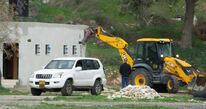
Israeli bulldozers on Wednesday morning embarked on carrying out large-scale demolitions in the vicinity of the military checkpoint near Qalandiya refugee camp, north of Occupied Jerusalem.
According to local sources, Israeli soldiers spread in the area as bulldozers from the municipality started to demolish a building and commercial structures. video
The municipal crew also removed shop and advertising signs. The demolitions took place along the street extending from the military road barrier to the main entrance to Qalandiya checkpoint.
According to local sources, Israeli soldiers spread in the area as bulldozers from the municipality started to demolish a building and commercial structures. video
The municipal crew also removed shop and advertising signs. The demolitions took place along the street extending from the military road barrier to the main entrance to Qalandiya checkpoint.

The Israeli occupation navy on Tuesday evening attacked Palestinian fishermen and reduced the permitted fishing range in Gaza waters.
According to the fishermen committees, Israeli gunboats opened machinegun fire at fishermen, forced them to leave their nets and go back to six nautical miles.
On June 4, the Israeli army announced the expansion of the fishing zone to 15 nautical miles after reducing it to 10 miles.
Since last May, the army had expanded the offshore fishing limit imposed on Gaza six times before shrinking it each time under different pretexts.
A report released by the fishermen committees said the Israeli naval forces opened fire 32 times last May at Palestinian fishermen and their boats off the coast of Gaza, leading to the injury of two fishermen.
The Israeli navy also arrested five fishermen, caused others to lose their nets and confiscated several boats during the same month.
According to the fishermen committees, Israeli gunboats opened machinegun fire at fishermen, forced them to leave their nets and go back to six nautical miles.
On June 4, the Israeli army announced the expansion of the fishing zone to 15 nautical miles after reducing it to 10 miles.
Since last May, the army had expanded the offshore fishing limit imposed on Gaza six times before shrinking it each time under different pretexts.
A report released by the fishermen committees said the Israeli naval forces opened fire 32 times last May at Palestinian fishermen and their boats off the coast of Gaza, leading to the injury of two fishermen.
The Israeli navy also arrested five fishermen, caused others to lose their nets and confiscated several boats during the same month.
11 june 2019
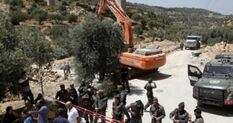
The Israeli occupation forces (IOF) on Tuesday morning destroyed a well and uprooted olive trees belonging to Palestinians in Umm al-Kibash area in the northern Jordan Valley. video
Local sources told a reporter for the Palestinian Information Center (PIC) that Israeli soldiers stormed an agricultural area in Umm al-Kibash belonging to local residents and embarked on destroying a well and uprooting olive trees.
They said that the Israeli army had already threatened to raze the well and olive trees, claiming the area is a nature reserve.
Israeli forces uproot hundreds of olive trees in Tubas
Israeli army bulldozers on Tuesday uprooted hundreds of Palestinian-owned olive trees and destroyed four water wells in Tammoun town, south of Tubas.
Murshid Bani Ouda, one of the farmers affected by the incident, said that the Israeli occupation army chopped off over 530 olive trees and destroyed water wells in Um al-Kbeish area in Tammoun.
Bani Ouda noted that the Israeli army had previously threatened to uproot the trees and demolish the wells under the pretext that the area is a "nature reserve", but the owners managed to thwart the Israeli move after legal efforts.
The term "nature reserve" is usually used by Israel in the West Bank as a tool to seize Palestinian lands for settlement purposes.
Local sources told a reporter for the Palestinian Information Center (PIC) that Israeli soldiers stormed an agricultural area in Umm al-Kibash belonging to local residents and embarked on destroying a well and uprooting olive trees.
They said that the Israeli army had already threatened to raze the well and olive trees, claiming the area is a nature reserve.
Israeli forces uproot hundreds of olive trees in Tubas
Israeli army bulldozers on Tuesday uprooted hundreds of Palestinian-owned olive trees and destroyed four water wells in Tammoun town, south of Tubas.
Murshid Bani Ouda, one of the farmers affected by the incident, said that the Israeli occupation army chopped off over 530 olive trees and destroyed water wells in Um al-Kbeish area in Tammoun.
Bani Ouda noted that the Israeli army had previously threatened to uproot the trees and demolish the wells under the pretext that the area is a "nature reserve", but the owners managed to thwart the Israeli move after legal efforts.
The term "nature reserve" is usually used by Israel in the West Bank as a tool to seize Palestinian lands for settlement purposes.
10 june 2019
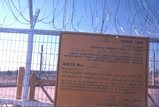
Israeli forces have seized an agricultural caravan belonging to a farmer from village of Khirbet Jubara, to the south of the occupied West Bank city of Tulkarem.
Head of the Khirbet Jubara Village Council, Ihsan Tahseen, told WAFA that Israeli forces escorted a large crane to a plot of land belonging to the Dasouki family, and seized the caravan.
He added that the land owner had just finished reclaiming their plot of land, which occupied a dunam and 800 square meters, and had a caravan placed in it, for agricultural purposes.
The targeted land is located at the entrance of the village, next a house demolished by Israeli forces, earlier in April, under the pretext that it was built without a permit.
The villagers of Khirbet Jubara, a small town trapped between the 1976 borderline and Israel’s apartheid wall, depend on agriculture and cultivation of chickens for their livelihood.
Israel has confiscated hundreds of dunams of farmland from the villagers, for the construction of the apartheid wall, which surrounds the village from all directions and leaves only two passage ways, al-Kafriyat checkpoint and Gate number 22, north and south of the village.
Israel’s wall has segregated approximately 4,000 dunams of land belonging to Khirbet Jubara and a number of neighboring villages.
Head of the Khirbet Jubara Village Council, Ihsan Tahseen, told WAFA that Israeli forces escorted a large crane to a plot of land belonging to the Dasouki family, and seized the caravan.
He added that the land owner had just finished reclaiming their plot of land, which occupied a dunam and 800 square meters, and had a caravan placed in it, for agricultural purposes.
The targeted land is located at the entrance of the village, next a house demolished by Israeli forces, earlier in April, under the pretext that it was built without a permit.
The villagers of Khirbet Jubara, a small town trapped between the 1976 borderline and Israel’s apartheid wall, depend on agriculture and cultivation of chickens for their livelihood.
Israel has confiscated hundreds of dunams of farmland from the villagers, for the construction of the apartheid wall, which surrounds the village from all directions and leaves only two passage ways, al-Kafriyat checkpoint and Gate number 22, north and south of the village.
Israel’s wall has segregated approximately 4,000 dunams of land belonging to Khirbet Jubara and a number of neighboring villages.
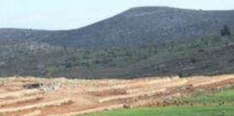
The Israeli occupation authorities have decided to illegally confiscate at least twenty Dunams of privately-owned Palestinian lands, in northern West Bank, to pave a new road for illegal colonies.
Ghassan Daghlas, a Palestinian official who monitors Israel’s colonialist activities in northern West Bank, said the lands and the newly planned segregated road are east of Nablus.
Daghlas added that the lands are owned by Palestinian farmers from Deir al-Hatab and Azmout villages, and will be used to pave roads leading to Elon Moreh illegal colony.
More than 400 Palestinians will be impacted by the planned road, which could also lead to more illegal confiscations of lands, especially since Israel implements buffer zones and other security measures to segregate such roads.
Israel’s colonies in the occupied West Bank, including those in and around East Jerusalem, are illegal under International Law, the Fourth Geneva Conventions and various United Nations resolutions.
Ghassan Daghlas, a Palestinian official who monitors Israel’s colonialist activities in northern West Bank, said the lands and the newly planned segregated road are east of Nablus.
Daghlas added that the lands are owned by Palestinian farmers from Deir al-Hatab and Azmout villages, and will be used to pave roads leading to Elon Moreh illegal colony.
More than 400 Palestinians will be impacted by the planned road, which could also lead to more illegal confiscations of lands, especially since Israel implements buffer zones and other security measures to segregate such roads.
Israel’s colonies in the occupied West Bank, including those in and around East Jerusalem, are illegal under International Law, the Fourth Geneva Conventions and various United Nations resolutions.
9 june 2019
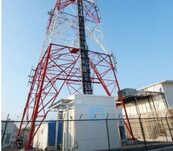
A group of illegal Israeli colonialist settlers attempted, Sunday, to stop the workers of the Wataniya Palestine Mobile Telecommunication Public Shareholding Company from installing a cellular tower, east of Hebron city, in the southern part of the occupied West Bank.
Media sources said approximately 50 Israeli colonists from the illegal Havat Gal outpost and Keryat Arba’ colony, accompanied by many soldiers, tried to stop the installation of the tower on the rooftop of a Palestinian home in the al-Kassara area, east of Hebron city.
Despite the attack, and an ensuing argument, the workers proceeded to install the tower, and the colonists left the scene.
The attack, and the attempt to stop the work, took place while many Israeli companies have been installing cellular towers in the same area, in the occupied city.
Media sources said approximately 50 Israeli colonists from the illegal Havat Gal outpost and Keryat Arba’ colony, accompanied by many soldiers, tried to stop the installation of the tower on the rooftop of a Palestinian home in the al-Kassara area, east of Hebron city.
Despite the attack, and an ensuing argument, the workers proceeded to install the tower, and the colonists left the scene.
The attack, and the attempt to stop the work, took place while many Israeli companies have been installing cellular towers in the same area, in the occupied city.
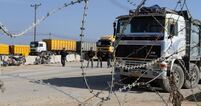
The Israeli occupation army on Sunday closed the border crossings of Karam Abu Salem and Beit Hanoun (Erez) at the pretext of Jewish celebrations.
The public relations and media office at the Karam Abu Salem crossing stated in a press release that the commercial crossing would be closed to the movement of cargo trucks for several days.
The Beit Hanoun crossing will also be closed and passengers will not be allowed to travel during the Jewish celebrations.
The Karam Abu Salem crossing in southern Gaza is an important point for the entry of goods into the besieged coastal territory, while Erez is the only restricted crossing for people, especially patients and foreign visitors, who need to travel between Gaza and the occupied Israeli territories after receiving certain permits.
The public relations and media office at the Karam Abu Salem crossing stated in a press release that the commercial crossing would be closed to the movement of cargo trucks for several days.
The Beit Hanoun crossing will also be closed and passengers will not be allowed to travel during the Jewish celebrations.
The Karam Abu Salem crossing in southern Gaza is an important point for the entry of goods into the besieged coastal territory, while Erez is the only restricted crossing for people, especially patients and foreign visitors, who need to travel between Gaza and the occupied Israeli territories after receiving certain permits.
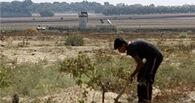
The Israeli occupation forces (IOF) on Sunday morning opened fire at Palestinian farmers and shepherds in the south of the Gaza Strip.
According to eyewitnesses, soldiers opened fire from watchtowers and on the ground at a group of farmers and shepherds in the east of Khan Younis and the southeast of Rafah.
Luckily, no one was injured in the shooting attacks.
According to eyewitnesses, soldiers opened fire from watchtowers and on the ground at a group of farmers and shepherds in the east of Khan Younis and the southeast of Rafah.
Luckily, no one was injured in the shooting attacks.
8 june 2019
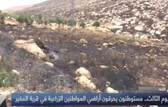
For the third consecutive day, illegal Israeli colonialist settlers burnt more than 100 olive trees, owned by a Palestinian family in al- Mughayyir Palestinian village, northeast of Ramallah in central West Bank.
The colonists invaded large areas of farmlands and orchards, and burnt more than 100 trees, owned by members of the Na’san family, the Palestinian TV has reported.
The family said they planted the trees on their own lands more than ten years ago, and has been since then tending to their orchards and fields despite the Israeli restrictions and constant violations, especially since they are in Area C of the occupied West Bank, under full Israeli control.
Palestinian firefighters tried to reach the lands, but the Israeli military restrictions prevented them from performing their duties.
Many villagers rushed to the lands to help the family, and managed to extinguish the fire using branches and sticks, preventing it from spreading to more lands, including wheat fields.
The Palestinian farmers in the area told Palestine TV that they would never abandon their lands and orchards, despite the constant Israeli attacks, including burning the lands and uprooting the trees.
The colonists invaded large areas of farmlands and orchards, and burnt more than 100 trees, owned by members of the Na’san family, the Palestinian TV has reported.
The family said they planted the trees on their own lands more than ten years ago, and has been since then tending to their orchards and fields despite the Israeli restrictions and constant violations, especially since they are in Area C of the occupied West Bank, under full Israeli control.
Palestinian firefighters tried to reach the lands, but the Israeli military restrictions prevented them from performing their duties.
Many villagers rushed to the lands to help the family, and managed to extinguish the fire using branches and sticks, preventing it from spreading to more lands, including wheat fields.
The Palestinian farmers in the area told Palestine TV that they would never abandon their lands and orchards, despite the constant Israeli attacks, including burning the lands and uprooting the trees.
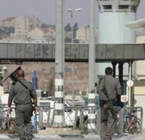
Israeli soldiers abducted, Saturday, a young Palestinian man near Bethlehem, and a young woman at Qalandia terminal, north Jerusalem, in the occupied West Bank, in addition to preventing farmers from entering their lands near Nablus.
The Bethlehem office of the Palestinian Prisoners’ Society (PPS) said the soldiers invaded Khalayel al-Louz area, southeast of the city, and abducted Yousef Nour Abu Srour, 24, after storming his home and searching it.
In addition, the soldiers abducted a young women at the Qalandia terminal north of Jerusalem, reportedly for carrying a knife in her purse. The abducted woman is from Jenin, in northern West Bank.
In related news, the soldiers invaded Palestinian agricultural lands in Sebastia town, north of the northern West Bank city of Nablus, and forced the farmers out.
The soldiers threatened to confiscate the farmers’ agricultural tools if they do not leave their lands, due to their proximity to the illegal Shavei Shomron colony, which was built on Palestinian lands.
The Bethlehem office of the Palestinian Prisoners’ Society (PPS) said the soldiers invaded Khalayel al-Louz area, southeast of the city, and abducted Yousef Nour Abu Srour, 24, after storming his home and searching it.
In addition, the soldiers abducted a young women at the Qalandia terminal north of Jerusalem, reportedly for carrying a knife in her purse. The abducted woman is from Jenin, in northern West Bank.
In related news, the soldiers invaded Palestinian agricultural lands in Sebastia town, north of the northern West Bank city of Nablus, and forced the farmers out.
The soldiers threatened to confiscate the farmers’ agricultural tools if they do not leave their lands, due to their proximity to the illegal Shavei Shomron colony, which was built on Palestinian lands.
7 june 2019
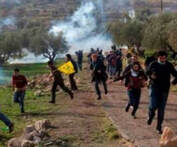
Israeli soldiers attacked, Friday, the weekly nonviolent procession against the illegal Annexation Wall and Colonies, in Bil’in village, west of the central West Bank city of Ramallah, wounding many protesters, and causing fire in olive orchards.
The protest was held by locals, accompanied by Israeli and international peace activists.
The Popular Committee in Bil’in said the protest started from the center of the village, and headed towards the Annexation Wall in Abu Lemon area.
It added that the protesters chanted for the liberation of Palestine, the removal of the illegal wall and colonies, national unity, and also marked the 52 anniversary of the “Naksa” when Israel occupied the rest of Palestinian (the West Bank, the Gaza Strip and East Jerusalem), during the six-day Israeli war.
The protesters also called for implementing the Right of Return of the refugees, and the release of all political prisoners, held by Israel.
The soldiers fired a barrage of gas bombs and concussion grenades at the nonviolent protesters, causing many to suffer the effects of teargas inhalation, in addition to causing fire in the olive orchards.
The protest was held by locals, accompanied by Israeli and international peace activists.
The Popular Committee in Bil’in said the protest started from the center of the village, and headed towards the Annexation Wall in Abu Lemon area.
It added that the protesters chanted for the liberation of Palestine, the removal of the illegal wall and colonies, national unity, and also marked the 52 anniversary of the “Naksa” when Israel occupied the rest of Palestinian (the West Bank, the Gaza Strip and East Jerusalem), during the six-day Israeli war.
The protesters also called for implementing the Right of Return of the refugees, and the release of all political prisoners, held by Israel.
The soldiers fired a barrage of gas bombs and concussion grenades at the nonviolent protesters, causing many to suffer the effects of teargas inhalation, in addition to causing fire in the olive orchards.
Page: 24 - 23 - 22 - 21 - 20 - 19 - 18 - 17 - 16 - 15 - 14 - 13 - 12 - 11 - 10 - 9 - 8 - 7 - 6 - 5 - 4 - 3
